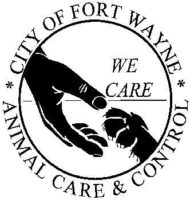
News release from Fort Wayne Animal Care & Control:
Advocating Safety Lessons for National Dog Bite Prevention Week: May 15-21, 2016
(May 16, 2016) – It may surprise you to know that over half of dog-bite injuries occur at home with dogs that are familiar to us. Adults with two or more dogs in the household are five times more likely to be bitten than those living without dogs at home.
During National Dog Bite Prevention Week, Fort Wayne Animal Care & Control reminds parents to supervise the interactions between children and dogs. According to shelter spokesperson Jodi Hamilton, “Young children often lack the skills to understand when an animal is uncomfortable or just wants to be left alone, so the key to safety is supervision and education.”
Animal Care & Control strongly advocates bite prevention to keep kids safe by providing bite free materials to schools, accommodating tour groups and attending community events.
“By teaching children how to properly approach dogs and to ask permission before they pet someone’s dog, animal bites can be greatly reduced.”
How to avoid being bitten by a dog
- Be cautious around dogs you don’t know.
- Treat your own pets with respect and gentle handling.
- NEVER leave a baby or small child alone with a dog.
- Avoid unfamiliar dogs. If a dog approaches to sniff you, stand still. In most cases, the dog will go away when it determines you are not a threat.
- Don’t pet a dog by reaching through a fence.
- Always ask permission before petting someone’s dog.
- Don’t run past a dog. Dogs naturally love to chase and catch things.
- Never disturb a dog that’s caring for puppies, sleeping or eating.
- If you are threatened by a dog, remain calm. Don’t scream or yell. If you say anything, speak calmly and firmly. Avoid eye contact. Try to stay still until the dog leaves, or back away slowly until the dog is out of sight. Don’t turn and run.
- If you fall or are knocked to the ground, curl into a ball with your hands over your head and neck. Protect your face.
Prevent your dog from biting
- Socialize your dog or young puppy, so it feels at ease around people and other animals. Gradually expose your dog to a variety of situations under controlled circumstances; continue that exposure on a regular basis.
- Don’t allow your dog to be in places where it might feel threatened or be teased.
- Attend a dog training class. The basic commands “sit,” “stay,” “off,” and “come” can be incorporated into fun activities that build a bond of obedience and trust between pets and people.
- Avoid highly excitable games like wrestling or tug-of-war.
- Use a leash in public to ensure you are able to control your dog.
- Keep your dog healthy with yearly vaccinations. How your dog feels directly affects how it behaves.
- Spay or neuter your pet. Altered dogs are less likely to bite.
- Don’t chain your dog. Chaining increases aggression in dogs.
What Should I Do If My Dog Bites Someone?
Even if the bite can be explained (e.g., someone stepped on your dog’s tail), it’s important to take responsibility for your dog’s actions.
Did you know that Indiana law requires a biting animal (dog, cat or ferret) be placed in ten (10) day rabies quarantine even if it’s vaccinated?
Many people are hesitant to report bites because they are afraid of the outcome. Once a report is filed, Fort Wayne Animal Care & Control must determine the severity of the bite, where the bite occurred (at home or off property) and how many times the animal has bitten. Those factors will determine whether or not the animal will be placed in the home for the quarantine period or housed at Fort Wayne Animal Care & Control for the ten (10) days required by state law. Fort Wayne Animal Care & Control does not automatically put biting animals to sleep. Owners that report bites are doing the responsible thing for the safety of other animals and the bite victim(s), human or animal. Fort Wayne Animal Care & Control wants nothing more than for the people and animals to be safe and healthy. Our goal, whenever possible, is to keep your animal at home where it belongs.
After a bite occurs, the following steps should be taken:
- Confine your dog away from the scene of the bite.
- Check on the victim’s condition. Wash wounds with soap and water. Professional medical advice should be sought.
- Report the bite. Call Fort Wayne Animal Care & Control inside the city and the sheriff’s department in the county.
- Consult your veterinarian for advice about dog behavior that will help prevent similar problems in the future.
- If someone else’s dog bites you, seek medical treatment, and then call authorities with everything you know about the dog to help animal control officers locate the dog.
Dogs are wonderful companions. By acting responsibly, owners not only reduce dog bite injuries, but also enhance the relationship they have with their dogs.















